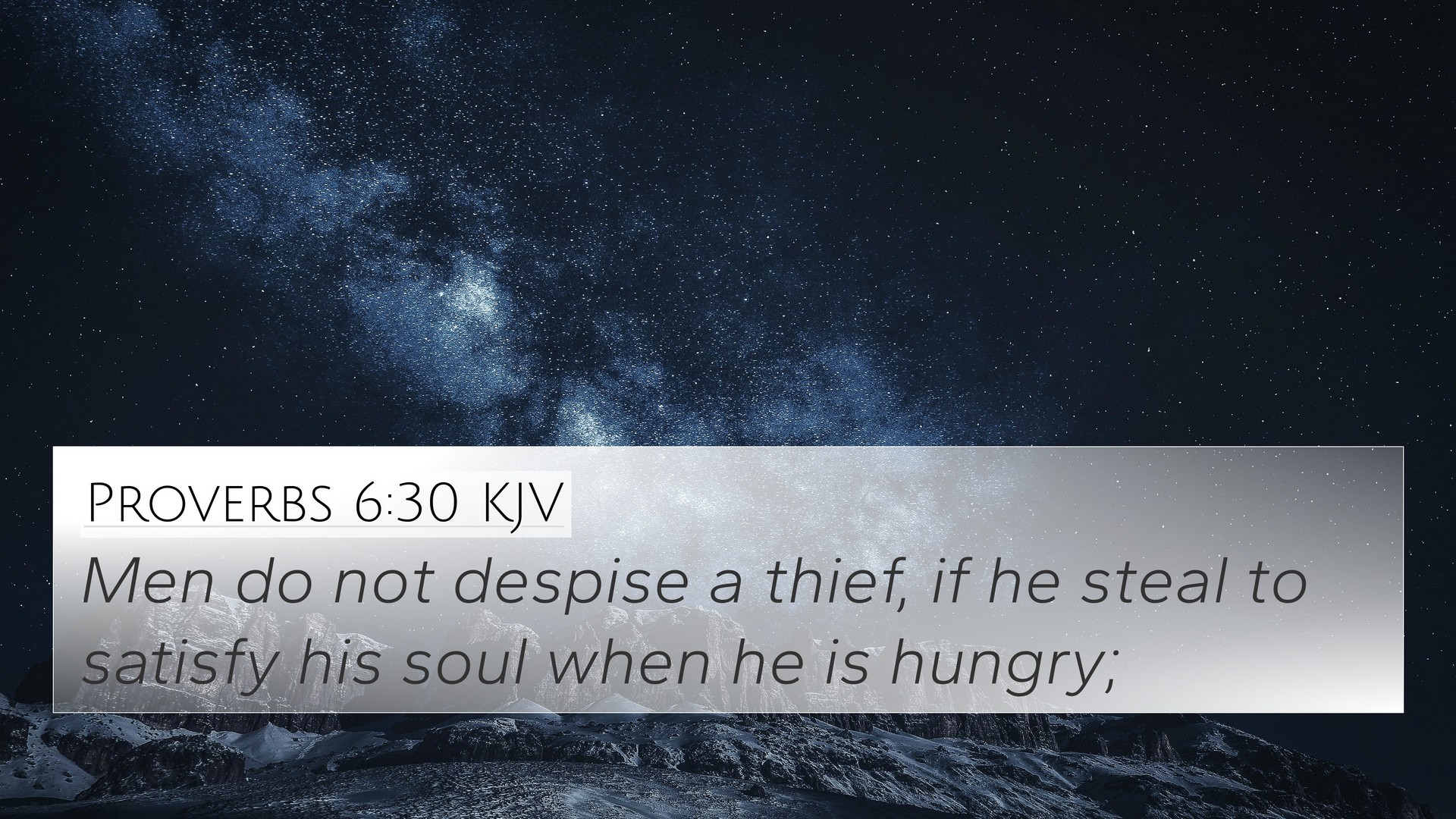Understanding Proverbs 6:30
Verse Text: "Men do not despise a thief, if he steal to satisfy his soul when he is hungry;" (Proverbs 6:30, KJV)
Summary of Meaning
This verse from Proverbs provides insight into human nature and the complexities of morality. It indicates that while theft is generally condemned, there exists an understanding and a degree of tolerance for actions driven by basic needs, such as hunger. The verse invites readers to reflect on compassion versus condemnation; it highlights a thematic exploration of mercy in the context of dire circumstances.
Key Insights from Public Domain Commentaries
- Matthew Henry: Henry emphasizes that although theft is a sin, there are situations that evoke sympathy, such as extreme necessity. He suggests that understanding the thief's circumstances can foster a compassionate response rather than outright condemnation.
- Albert Barnes: Barnes points out that this proverb illustrates a common human understanding: that basic human needs may sometimes drive individuals to commit acts that society typically scorns. He posits that acknowledging this aspect of humanity does not excuse behavior but rather contextualizes it.
- Adam Clarke: Clarke elaborates on the idea that social structures sometimes fail individuals in need, causing them to take desperate measures. He highlights that society's tendency to excuse certain acts of theft due to hunger raises questions about justice and moral righteousness.
Cross References
Proverbs 6:30 connects with various other Scriptures that delve into themes of human need, morality, and compassion.
- Exodus 22:1 - Discusses the penalty for stealing sheep, reflecting the seriousness of theft.
- Matthew 12:1-8 - Highlights how Jesus defends his disciples who pluck grain on the Sabbath, stressing mercy over sacrifice.
- Luke 16:19-31 - The parable of the rich man and Lazarus illustrates the consequences of ignoring the needy.
- James 2:15-16 - Speaks about the importance of tending to the needs of the poor instead of merely wishing them well.
- 1 John 3:17 - Discusses how having material goods and ignoring those in need reflects a lack of true love.
- Mark 7:21-23 - Lists the immoral acts arising from the heart, including theft, which highlights the internal struggle of sin.
- Proverbs 21:13 - Warns that ignoring the pleas of the poor leads to a lack of help in one's time of need.
Thematic Connections
This verse and its commentary demonstrate several thematic connections across both the Old and New Testaments. By cross-referencing other Scriptures, we can see how they collectively address issues of moral integrity and compassion for the needy. Here are some thematic explorations:
- Compassion vs. Justice: Many verses challenge readers to find a balance between upholding justice while remaining compassionate towards those in need.
- The Role of Need in Morality: Scripture often revisits the idea that survival instincts can lead to moral dilemmas.
- Understanding Human Nature: The Bible recognizes the complexity of human behavior in desperate situations.
Conclusion
Proverbs 6:30 invites deep reflection on our societal values and personal principles. By linking this verse with various Scriptures, we have a broader understanding of how the Bible addresses the themes of theft, compassion, and moral complexity. Understanding these connections through comprehensive Bible cross-reference materials enriches our study of Scripture and offers profound insights into our own lives.



